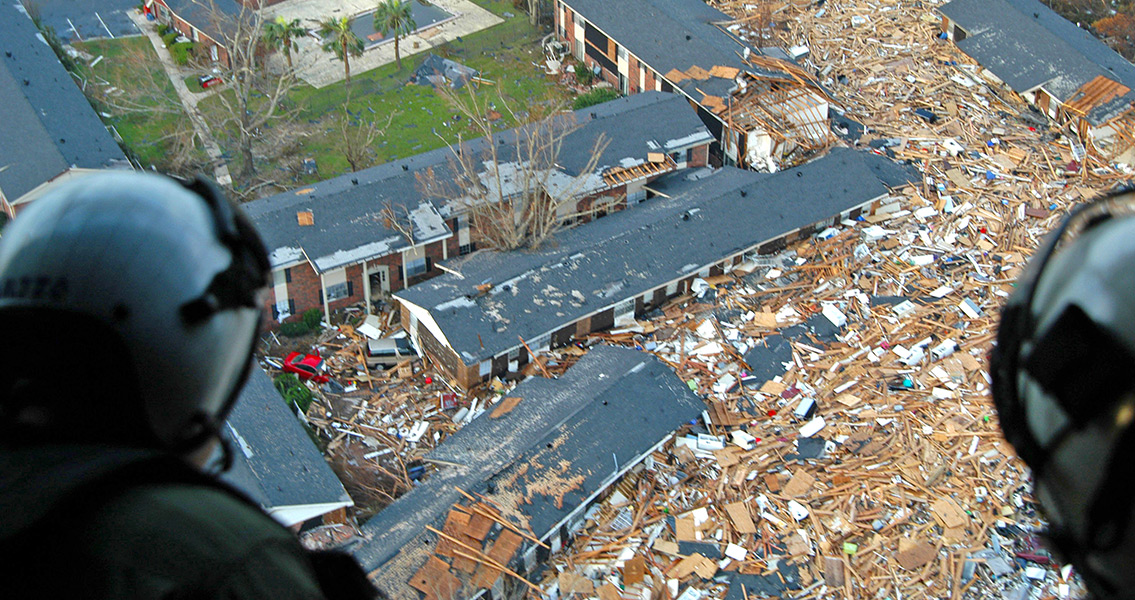<![CDATA[Hurricane Katrina, which rocked the Gulf Coast of the USA in 2005, was one of the costliest natural disasters and one of the deadliest hurricanes in American history. At least 1,833 people lost their lives in the hurricane and subsequent flooding. The most significant number of deaths occurred in New Orleans, Louisiana, after the levee system of flood defences failed. Around 80% of the city became flooded, with waters taking many weeks to lower. Interestingly, many residents of New Orleans consciously decided to remain in the city, hoping to 'ride out the storm.' New research by Anja Nadine Klopfer, from the Amerika-Institut at Ludwig-Maximilians-Universität München, has explored the narrative of 'choosing to stay.' In the immediate aftermath of Katrina, government officials were quick to blame residents of New Orleans for the death toll. Casualties were attributed to people not obeying evacuation orders. "In other words, the deadly impact of the flooding was explained by the outright disobedience of New Orleans citizens, by their negligence, and by their inability to make “correct” decisions," Klopfer explains. Perversely, the victims of Katrina were being blamed for their own suffering. In examining attitudes towards people who chose to stay in New Orleans despite the danger of Katrina, Klopfer has reached an interesting conclusion. She argues that choosing to stay was a conscious decision based on local identity stemming from the Civil War-era. "I am not leaving New Orleans, Louisiana. I was born here in 1963 on December 24th. And this is where the f*** I’m gonna die, whether you try to drown me or I die naturally. I’m gonna stay here until the end," stated a New Orleans resident in the 2006 documentary When the Levees Broke. It is this attitude which most interested Klopfer. For Klopfer, this mindset shows that those who remained in New Orleans did so as part of a 'choosing to stay' narrative. Whilst this does not necessarily explain the actual decision-making process, it still remains meaningful. In this light, stating that you 'chose to stay' was a strong expression of power. It roots an individual to their local environment where they understand the weather patterns, the power of hurricanes and flood protection infrastructure. "Within the frameworks of local, place- and experience-based knowledge, staying made perfect sense," Klopfer explains. Interestingly, Klopfer notes that this form of expression has deep roots in Louisiana. Following the American Civil War in the 1860s, a narrative of progress dominated American ideology. After a bloody war which had originated in the issue of slavery, it was felt that America was progressing and rebuilding itself anew. For many African Americans in Louisiana, Klopfer notes, the reality was very different. It has been asked why these now-free groups did not move North, away from the Confederate States. Klopfer argues that these subaltern groups understood that they 'chose' to stay; they wanted to remain in Louisiana as they knew the area and, for better or worse, it was home. Klopfer's argument holds substantial merit in explaining discussions about why so many New Orleanians remained in the city, despite repeated warnings about Katrina's strength. Whilst she admits that she does not address actual reasons many residents had for staying, Klopfer does examine how people explained their decision to remain in the city. For more information: www.juh.sagepub.com Image courtesy of Wikimedia Commons user: Spellcast]]>
New Perspectives on Hurricane Katrina
